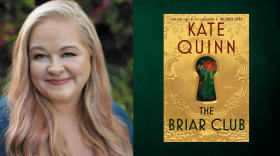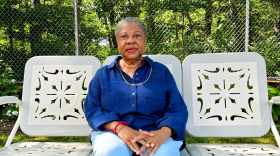-
Beyond the Page with Kate Quinn
Kate Quinn is a New York Times and USA Today bestselling author of historical fiction. A native of Southern California, she attended Boston University, where she earned bachelor’s and master’s degrees in classical voice. She’s written a number of novels, including four in the Empress of Rome Saga and two set in the Italian Renaissance before turning to the 20th century with books like The Alice Network, The Huntress, The Rose Code, The Diamond Eye, and most recently, The Briar Club.
She and her husband now live in Maryland with three black rescue dogs. Check out more about Kate Quinn here.
GBH's Craig LeMoult moderates the conversation.Partner:GBH Events -
In Westford, Mass., wild and controversial theories surround a stone carving's origins
Jeff Belanger, host of the New England Legends podcast, joined GBH's All Things Considered to discuss mysterious Westford Knight. -
Why Boston's Busing Crisis Still Matters, 50 Years Later: Film Screening and Discussion
In September, 1974 – two days after her 14th birthday – Leola Hampton boarded a school bus that would launch her into the heart of one of the most divisive and defining moments in Boston history: court-ordered school desegregation. She and her older sister, Linda Starks-Walker, were bused from their home in the predominantly Black neighborhood of Roxbury into the white, working-class neighborhood of South Boston. They navigated a violent and virulently racist high school experience so scarring that a half-century later, they are only now beginning to discuss it with each other.
Leola and Linda share their story in GBH News' short documentary, "'Never Cried': Boston's Busing Legacy". Join us for a screening of the film, along with a discussion with the film's producer and subjects about how the legacy of Boston's busing crisis lives on today.Partner:GBH NEWS -
Edward O’Keefe with 'The Loves of Theodore Roosevelt', the Women Who Created a President
In this evening focused on women’s and family history, Edward F. O’Keefe shines light on the women who “created” President Roosevelt—the impact and influence of, among others, his mother, sisters, and his wives.
The Loves of Theodore Roosevelt is based on dozens of interviews with descendants, thousands of archives, and new discoveries at Harvard University and Roosevelt’s home.
Following an illustrated presentation comprised of new and exclusive photographs, O’Keefe is in conversation with the Pulitzer Prize-winning historian Debby Applegate.
Presented by American Ancestors’ American Inspiration series in partnership with Ford Hall Forum at Suffolk University and GBH Forum Network.Partner:American Ancestors Ford Hall Forum -
The Governor, the Sheriff, and the Sawyer: a New Hampshire Perspective on the Coming of the Revolution
Join the Paul Revere House for the final event in their 2024 Lowell Lecture Series. This three-part series focuses on the lesser-known express assignments Paul Revere completed. Speakers will share the importance of his courier work as part of a communications system that involved complex overlapping networks of leaders of all stations. The series will also explore the very practical aspects of long-distance horse journeys and the local colonial politics in key communities Revere interacted with.
Paul Revere made multiple rides to New Hampshire to pass messages between Patriot groups. The conventional narrative of the American Revolution emphasizes the role of extra-legal events in Massachusetts such as the Boston Tea Party and Stamp Act riots. Yet, extra-legal actions were not exclusive to Massachusetts—New Hampshire had a long tradition of protest, especially when connected to timber. Laws passed by Parliament in 1708 and 1722 that claimed pine trees for the masts needed for the Royal Navy, among other items contributed to growing discontent with colonial rule, reflected in a series of demonstrations and riots through the 1700s. By late 1774, New Hampshire colonists were seizing Royal munitions.
Peter Flood, author of the 2014 Revere House Gazette article, "A Week in December – Paul Revere’s Secret Mission to New Hampshire, will join the discussion.
Presented in partnership with GBH, the Suffolk University History Department, Milton Historical Society/Suffolk Resolves House (Milton, MA), Carpenters’ Hall (Philadelphia, PA), Fraunces Tavern Museum (New York, NY), and the Portsmouth Athenaeum (Portsmouth, NH), with funding from the Lowell Institute. For more information, please contact staff@paulreverehouse.org or visit paulreverehouse.org.Partner:Paul Revere Memorial Association -
The Narragansett Pacer: The Finest Riding Horse in 18th-Century New England
Join the Paul Revere House for the second event in their 2024 Lowell Lecture Series. This three-part series focuses on the lesser-known express assignments Paul Revere completed. Speakers will share the importance of his courier work as part of a communications system that involved complex overlapping networks of leaders of all stations. The series will also explore the very practical aspects of long-distance horse journeys and the local colonial politics in key communities Revere interacted with.
Horses first appeared in New England in 1629, when Francis Higginson shipped approximately 25 mares and stallions from Leicestershire, England to the Massachusetts Bay Colony. Horses were central to survival in terms of work, travel, communication, and leisure. However, for New Englanders, horses were also a staple exportation commodity, and by the mid-eighteenth century New England led the way in shipping horses to the sugar colonies. Amongst the diverse types of horses that were raised in New England, the Narragansett Pacer was exceptional in many ways. The Pacer’s easy gait made it suitable for both long-distance travel and racing. The Pacer was the first “truly” American breed of horse, and it was in high demand all around the Atlantic World. However, from such promising beginnings, the Pacer was extinct by the next century. The talk will examine how the Narragansett Pacer emerged in Rhode Island in the 17th century, what made it so special as riding horse, how the breed is connected to well-known people including Paul Revere and George Washington, and how it has been memorialized in literature and art.
Presented in partnership with GBH, the Suffolk University History Department, Milton Historical Society/Suffolk Resolves House (Milton, MA), Carpenters’ Hall (Philadelphia, PA), Fraunces Tavern Museum (New York, NY), and the Portsmouth Athenaeum (Portsmouth, NH), with funding from the Lowell Institute. For more information, please contact staff@paulreverehouse.org or visit paulreverehouse.org.Partner:Paul Revere Memorial Association -
Stephen Puleo with The Great Abolitionist: Charles Sumner and the Fight for a More Perfect Union
The Great Abolitionist is the first major biography of Charles Sumner in over 50 years. Employing his “vast knowledge of 19th-century Boston and its diffident attitude toward slavery and integration,” Stephen Puleo calls his book a “biographical history” that brings to life two decades when the nation’s very fate hung in the balance -- when slavery consumed Congressional debate, America careened toward civil war, and the country dealt with the war, the assassination of a President, and the monumental task of Reconstruction. Before, during, and after the war, Charles Sumner’s voice rang strongest, bravest, and most unwavering, often at the cost of great personal sacrifice. He moved America toward the twin goals of abolitionism and equal rights for emancipated people, which he fought for literally until the day he died. From the award-winning author-historian we’ll gain a deeper understanding of this remarkable abolitionist and the time in which he lived.Partner:American Ancestors -
New book uncovers the history of Black homeownership on Martha’s Vineyard
In the book, “Black Homeownership on Martha’s Vineyard: A History,” authors Thomas Dresser and Richard Taylor trace the presence of Black Americans on the Vineyard back to pre-Revolutionary War, through the Underground Railroad and the Civil War, and into the 20th century and the Great Migration. -
Revere’s Other Rides
The 2024 Lowell Lecture Series focuses on the lesser-known express assignments Paul Revere completed. Speakers will share the importance of his courier work as part of a communications system that involved complex overlapping networks of leaders of all stations. The series will also explore the very practical aspects of long-distance horse journeys and the local colonial politics in key communities Revere interacted with.Presented by Paul Revere Memorial Association in partnership with GBH, the Suffolk University History Department, Milton Historical Society/Suffolk Resolves House (Milton, MA), Carpenters’ Hall (Philadelphia, PA), Fraunces Tavern Museum (New York, NY), and the Portsmouth Athenaeum (Portsmouth, NH), with funding from the Lowell Institute. All lectures are free and open to the public. -
Boston’s Black educators were fighting their own battle through desegregation
That era 50 years ago was dominated by resentment and isolation within the district, they say.









